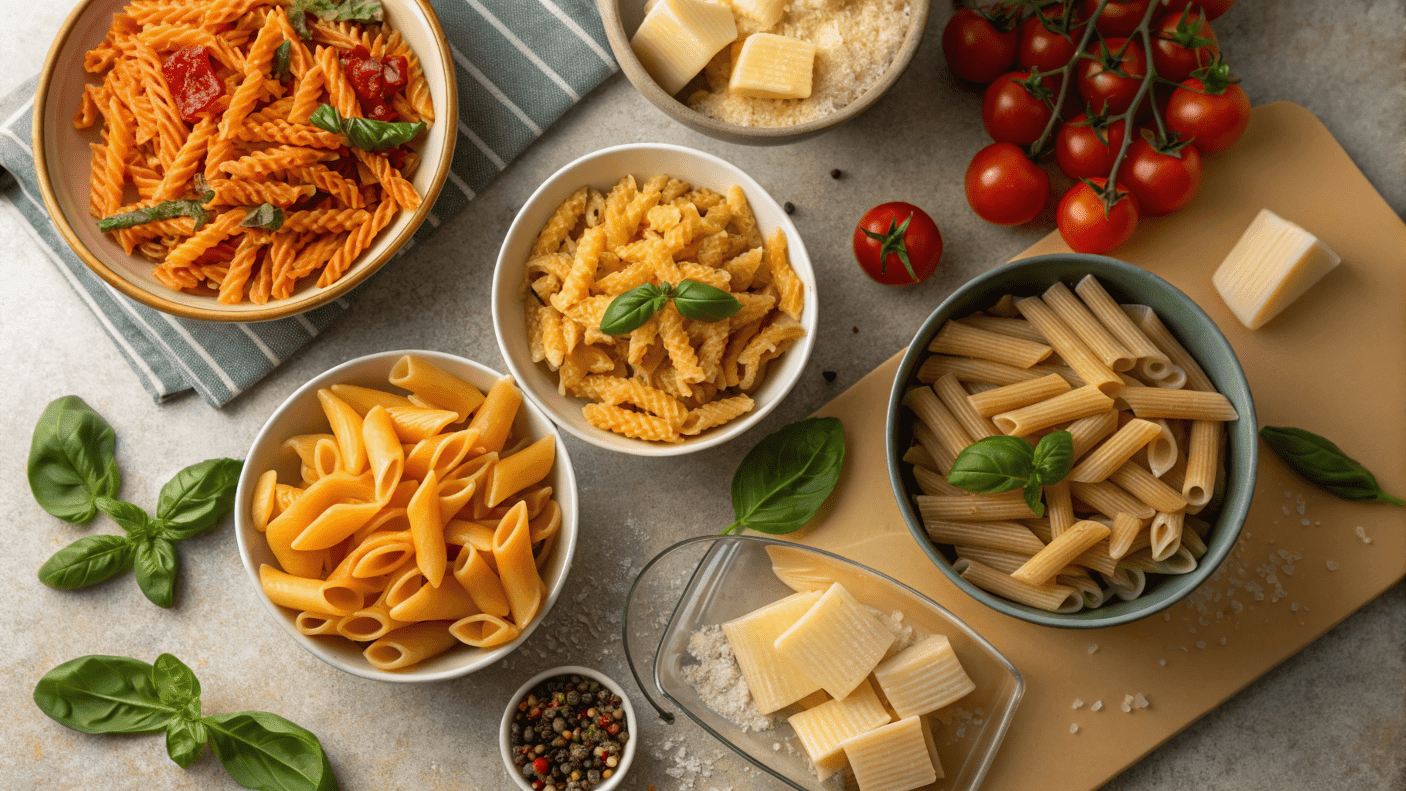Have you ever started cooking your favorite dish only to realize you don’t have the exact pasta you need? Don’t worry—you’re not alone! The hunt for the perfect substitute can feel like a puzzle, but it’s also an opportunity to get creative. So, what pasta is closest to mostaccioli? This is the ultimate question for pasta lovers who want to keep their recipes delicious without missing a beat. Stick with me, and we’ll uncover some fantastic alternatives that fit seamlessly into your dishes while staying true to the flavors you love.
Pasta is all about versatility, and mostaccioli is no exception. Whether you’re whipping up a comforting casserole or a vibrant pasta salad, finding a substitute is easier than you might think. Plus, it’s like a fun little challenge—your next meal could turn out even better than planned! Ready to dive in? Let’s explore some delicious possibilities together!
Table of Contents
Unpacking the Unique Appeal of Mostaccioli
Defining Mostaccioli: Texture, Shape, and Culinary Uses
Mostaccioli is a beloved pasta shape with a unique charm. It’s a short, tube-shaped pasta with smooth sides, unlike its ridged cousin, penne. This texture makes it ideal for holding lighter sauces, like a simple olive oil dressing or marinara, without overpowering the dish. The smooth surface allows flavors to coat it evenly, ensuring every bite is delightful. Its name, which translates to “small mustaches” in Italian, adds to its playful appeal, making it a fun option for families and gatherings.
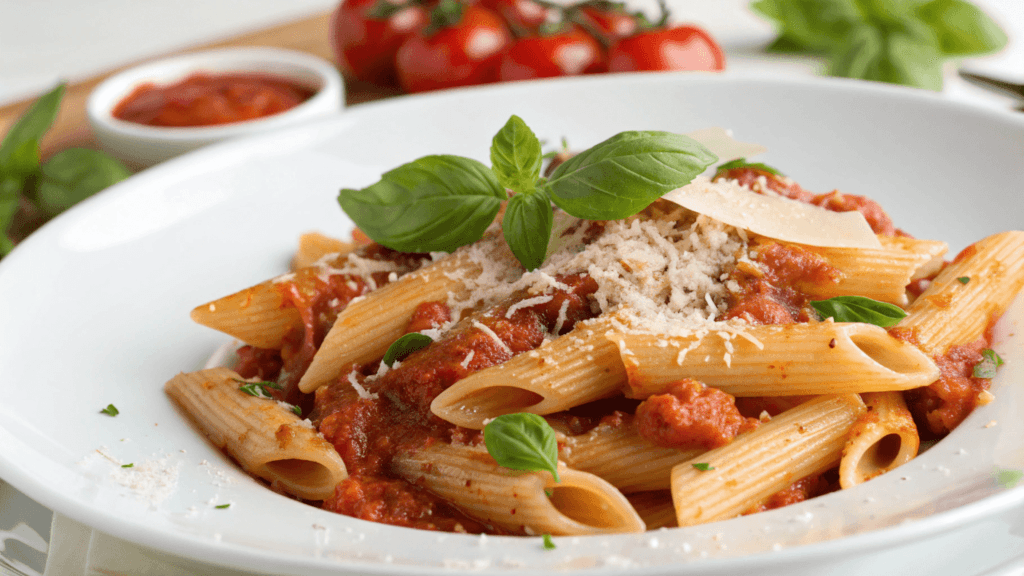
In addition, mostaccioli is incredibly versatile. You can bake it into casseroles, toss it into salads, or serve it as a hearty main dish. Its hollow center helps sauces and spices infuse every bite, making it a favorite for creamy or cheesy recipes. Whether you’re cooking for a weeknight dinner or a special event, it adapts effortlessly.
What’s more, mostaccioli is easy to cook. It takes just about 10 minutes to boil to a perfect al dente texture. This quick preparation makes it a go-to for busy days when you want something satisfying without spending hours in the kitchen. So, if you’re wondering what pasta is closest to mostaccioli, you’ll want to keep an eye out for other short, tubular pastas.
Mostaccioli Texture and Shape Highlights
| Feature | Description |
|---|---|
| Texture | Smooth sides for lighter sauces and even coating |
| Shape | Short and tubular, ideal for capturing sauces and ingredients |
| Culinary Uses | Perfect for baking, salads, creamy dishes, and weeknight meals |
Learn how mostaccioli compares to similar pastas in this detailed Baked Ziti vs. Mostaccioli guide.
Why Mostaccioli Stands Out Among Tube-Shaped Pastas
Mostaccioli shines among tube-shaped pastas because of its smooth texture and adaptability. Unlike rigatoni or penne, its smooth surface provides a different mouthfeel, perfect for dishes that call for a delicate touch. This makes it ideal for lighter sauces, where the pasta doesn’t compete with the flavors but complements them beautifully.
Another reason mostaccioli is unique is its ability to blend seamlessly into baked dishes. It works as the perfect base for cheesy casseroles and oven-baked pasta dishes, delivering a comforting texture that pairs well with melted cheese and savory herbs. Plus, its medium size makes it versatile for everything from salads to soups.
When it comes to replacements, mostaccioli is often compared to penne and ziti. However, its smooth sides and slightly smaller diameter give it an edge for certain recipes. For example, if you’re looking to recreate a light pasta salad or a baked ziti dish, mostaccioli’s characteristics make it a top contender.
Comparison of Tube-Shaped Pastas
| Pasta Type | Texture | Best Use Cases |
|---|---|---|
| Mostaccioli | Smooth | Light sauces, baked dishes, pasta salads |
| Penne | Ridged | Hearty, chunky sauces, oven-baked casseroles |
| Ziti | Smooth | Baked dishes, creamy recipes, pasta al forno |
| Rigatoni | Ridged | Thick sauces, meat-based recipes, stuffed dishes |
Mostaccioli’s balance of texture, shape, and versatility makes it stand out, even among its tube-shaped pasta peers. It’s no wonder it’s such a crowd-pleaser! For those curious about using different pasta types in baked dishes, check out this no-meat Baked Ziti Recipe.
The Closest Pasta Options to Replace Mostaccioli
Comparing Penne, Ziti, and Rigatoni for Similarities
When you’re out of mostaccioli, penne, ziti, and rigatoni are the top contenders for replacements. Each of these pastas shares similarities, yet they also bring unique features to the table. Penne, for instance, is a short, tube-shaped pasta with ridges on its surface. These ridges are perfect for clinging to hearty sauces like marinara or pesto, making it a fantastic choice for robust recipes. It’s slightly angled at the ends, giving it a stylish, tapered look.
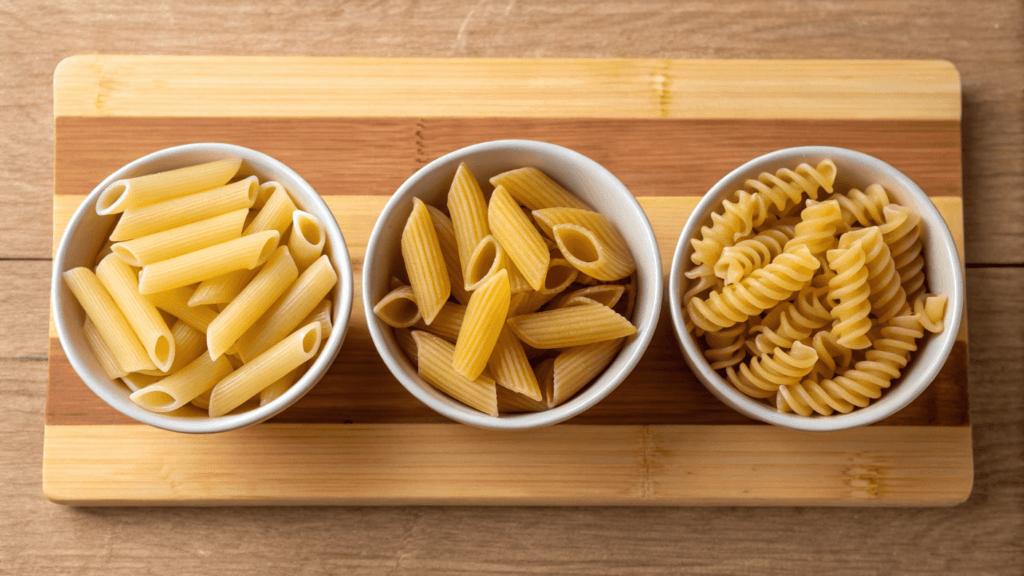
Ziti, on the other hand, is a smoother cousin to penne and mostaccioli. Its straight-cut ends and smooth surface make it ideal for baked dishes like pasta al forno. If you’re planning to layer your dish with melted cheese, ziti works wonderfully to soak up the flavors while maintaining its structure.
Then there’s rigatoni, the largest of the three. Its ridged surface and wide hollow center make it perfect for thick, meaty sauces or casseroles. It holds its shape beautifully, even after baking, which is why it’s often used in hearty meals. While all three options are great substitutes, your choice depends on the dish you’re making and the texture you prefer.
Table: Comparing Penne, Ziti, Rigatoni and Mostaccioli
| Pasta Type | Surface | Size | Best Pairings |
|---|---|---|---|
| Mostaccioli | Smooth | Medium | Light sauces, baked casseroles |
| Penne | Ridged | Medium | Chunky sauces, pasta salads |
| Ziti | Smooth | Medium | Creamy bakes, layered dishes |
| Rigatoni | Ridged | Large | Thick, meaty sauces, baked meals |
If you want a protein-packed dinner, consider pairing pasta with bold flavors like Beef Heart. Its rich taste complements hearty pasta dishes beautifully.
How Short Tube Pastas Perform in Classic Recipes
Short tube pastas like mostaccioli, penne, ziti, and rigatoni are highly versatile. They excel in classic recipes because of their ability to trap sauces and hold up well during cooking. Their tubular shape allows them to capture bits of sauce, cheese, and even small chunks of meat or vegetables, ensuring every bite is packed with flavor.
In baked dishes, short tube pastas are unbeatable. Their structure prevents them from getting mushy, even after prolonged baking. For pasta salads, smooth options like ziti and mostaccioli give a silky texture, while ridged pastas like penne add a bit more grip, holding onto dressings perfectly.
Key Benefits of Short Tube Pastas in Recipes:
- They hold sauces exceptionally well, enhancing flavor.
- Perfect for baking, as they retain their shape without overcooking.
- Suitable for both creamy and tomato-based dishes.
- Their hollow centers make them great for soaking up broths and sauces in soups.
Chart: Performance of Short Tube Pastas in Recipes
| Pasta Type | Baking | Salads | Soups | Chunky Sauces |
|---|---|---|---|---|
| Mostaccioli | ⭐⭐⭐⭐ | ⭐⭐⭐⭐ | ⭐⭐⭐ | ⭐⭐⭐ |
| Penne | ⭐⭐⭐⭐ | ⭐⭐⭐ | ⭐⭐⭐⭐ | ⭐⭐⭐⭐ |
| Ziti | ⭐⭐⭐⭐ | ⭐⭐⭐⭐ | ⭐⭐⭐ | ⭐⭐ |
| Rigatoni | ⭐⭐⭐⭐ | ⭐⭐ | ⭐⭐⭐⭐ | ⭐⭐⭐⭐ |
Short tube pastas bring versatility, texture, and flavor to the table. Whether you’re baking, tossing a salad, or serving a hearty soup, they never disappoint! For those who love experimenting with new shapes, consider Gigli Pasta. Its whimsical, bell-like shape is excellent for adding visual flair to your meals.
Making the Right Choice: Selecting a Substitute for Mostaccioli
Factors to Consider: Sauce Pairing, Cooking Style, and Texture
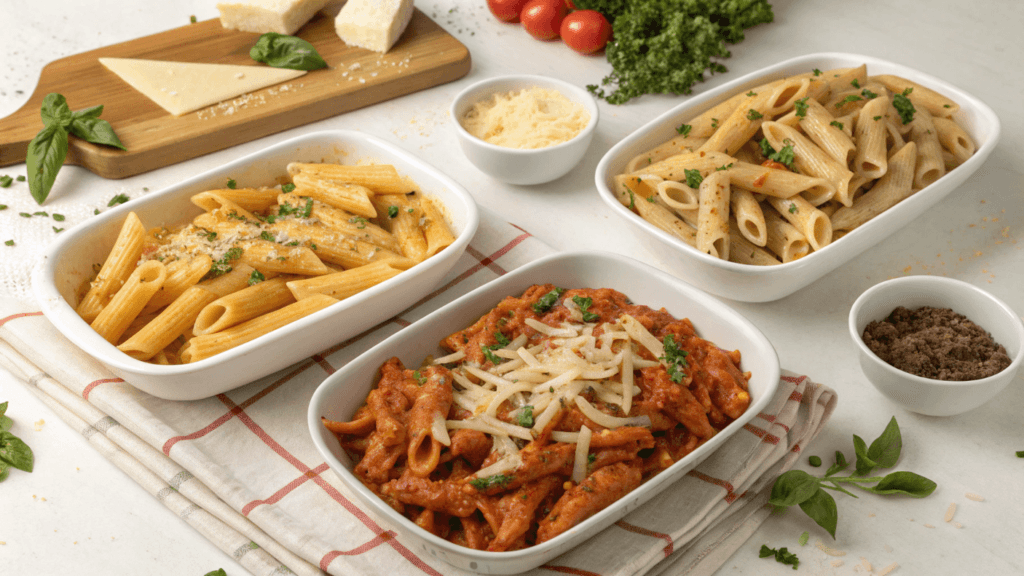
Choosing the perfect pasta substitute for mostaccioli comes down to a few key factors: sauce pairing, cooking style, and texture. First, consider the type of sauce you’ll be using. For creamy sauces, smooth pasta like ziti or mostaccioli works best because the sauce evenly coats the surface. Chunky, hearty sauces pair beautifully with ridged pastas like penne or rigatoni, which grip the sauce for a flavorful bite.
Next, think about your cooking method. If you’re baking your dish, sturdy options like rigatoni or ziti are ideal because they hold their shape under heat. For stovetop recipes, most tube-shaped pastas can work, but their size and thickness will affect the cooking time.
Finally, pay attention to texture. Smooth pastas give a silky finish, while ridged varieties add a bit of chewiness. If you’re recreating a recipe with mostaccioli, choose a substitute that mimics its medium size and hollow structure for the best results.
Table: Factors for Selecting Mostaccioli Substitutes
| Factor | Best Substitute | Reason |
|---|---|---|
| Creamy Sauces | Ziti, Mostaccioli | Smooth surface for even coating |
| Chunky Sauces | Penne, Rigatoni | Ridged texture holds sauce |
| Baking | Rigatoni, Ziti | Retains shape and structure when baked |
| Quick Cooking | Penne, Mostaccioli | Cooks faster than larger alternatives |
Expert Tips for Adapting Recipes to Alternative Pasta Shapes
Switching to a different pasta shape might feel tricky, but it’s easier than you think! Start by adjusting your cooking time. Smaller pastas like penne cook faster, so keep an eye on the boiling water. On the other hand, larger shapes like rigatoni may need an extra minute or two to reach the perfect al dente texture.
Another tip is to consider the sauce-to-pasta ratio. Since ridged pastas hold more sauce, you may need to add a little extra to keep things balanced. When baking, lightly toss the pasta with sauce before layering it into your dish to ensure even coverage.
Finally, don’t shy away from experimenting! Try mixing pasta shapes in a recipe for added texture and interest. It’s like creating a surprise in every bite. With these tips, you’ll find switching from mostaccioli to a substitute both fun and rewarding.
Key Tips for Adapting Recipes:
- Adjust cooking time to match the pasta’s size and thickness.
- Increase the sauce slightly when using ridged pastas like penne.
- Toss the pasta with sauce before baking for even flavor distribution.
- Mix different pasta shapes to add texture and creativity to your dish.
Chart: Pasta Substitutes Cooking Guide
| Pasta Type | Boiling Time | Sauce Absorption | Best for Baking | Texture |
|---|---|---|---|---|
| Mostaccioli | 10-12 minutes | Moderate | Excellent | Silky |
| Penne | 9-11 minutes | High | Good | Chewy |
| Ziti | 11-13 minutes | Moderate | Excellent | Soft |
| Rigatoni | 12-14 minutes | High | Excellent | Chewy and Firm |
By focusing on these factors and tips, you’ll master adapting recipes without compromising flavor or texture. Plus, experimenting can make cooking even more enjoyable! For more tips, dive into our guide on the Gigli Pasta Guide.
Cooking Mostaccioli Alternatives for Perfect Results
Al Dente Cooking Tips for Tube-Shaped Pastas
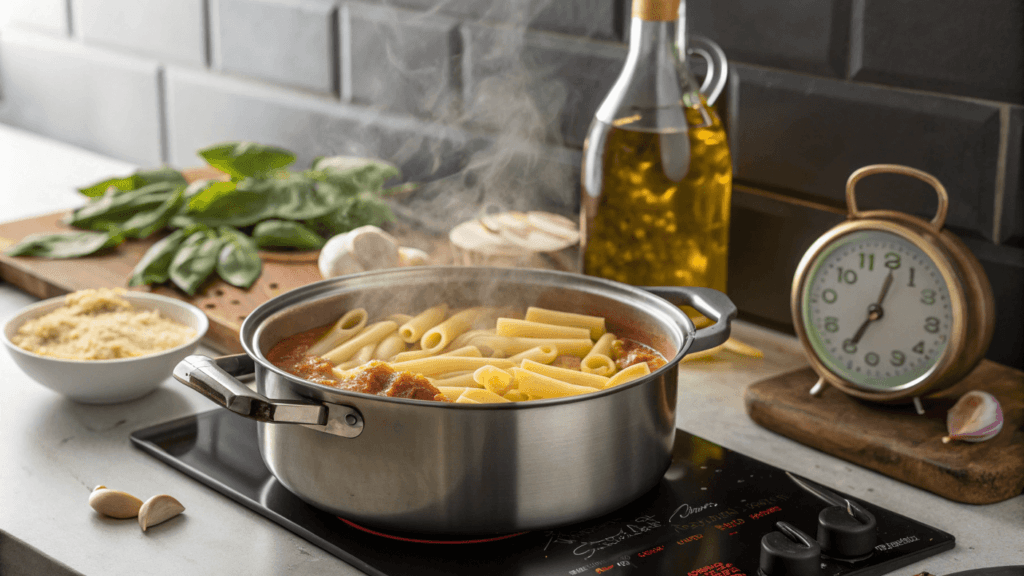
Cooking tube-shaped pasta to a perfect al dente texture is essential for capturing flavor and maintaining structure. First, start by using plenty of water—about four to six quarts per pound of pasta. This prevents the pasta from sticking together. Once the water is boiling, add a generous pinch of salt to enhance the pasta’s flavor.
Next, check the cooking time on the package. Most tube-shaped pastas, like penne and rigatoni, take between 9-14 minutes. However, to achieve al dente, you’ll want to cook them slightly less than the recommended time. For example, if the box says 12 minutes, start testing at the 10-minute mark.
Stir the pasta occasionally while it cooks to prevent clumping. Once the pasta is firm to the bite with no raw center, drain it immediately. Avoid rinsing, as this removes the starch that helps sauces cling to the pasta.
Table: Al Dente Cooking Steps
| Step | Tip |
|---|---|
| Water Amount | Use 4-6 quarts per pound of pasta |
| Salt the Water | Add 1-2 tablespoons for enhanced flavor |
| Cooking Time | Test 2 minutes before the suggested time |
| No Rinsing | Preserve starch for better sauce adherence |
Avoiding Common Mistakes When Substituting Mostaccioli
Switching to a different pasta can be fun, but a few common mistakes could affect your dish. First, don’t forget to adjust the cooking time. Some substitutes, like rigatoni, take longer than mostaccioli to cook. Always check for doneness early to avoid overcooking, which can make the pasta mushy.
Another mistake is using the wrong sauce-to-pasta ratio. Ridged pastas like penne hold more sauce, so you might need less to avoid overwhelming the dish. Conversely, smooth pastas like ziti require a bit more sauce to keep things flavorful and moist.
Lastly, avoid substituting very large or tiny pasta shapes. These can change the dish’s texture and balance. Stick with medium-sized, tube-shaped pastas for the closest match to mostaccioli. Remember, experimenting is great, but staying mindful of these tips will ensure a delicious outcome.
Key Mistakes to Avoid:
- Overcooking pasta by ignoring its size or thickness.
- Using the wrong sauce ratio for ridged or smooth pastas.
- Substituting with drastically different shapes, altering the dish’s texture.
Chart: Common Mistakes and Fixes
| Mistake | Solution |
|---|---|
| Overcooking pasta | Test for doneness early and often |
| Incorrect sauce-to-pasta ratio | Adjust sauce based on the pasta’s texture |
| Choosing unsuitable shapes | Stick with medium tube-shaped alternatives |
By following these tips and avoiding common pitfalls, you’ll ensure every dish is as close to perfect as possible. Substituting mostaccioli doesn’t have to be complicated—it can even be a creative and tasty adventure!
Innovative Ways to Use Mostaccioli Substitutes
Transforming Baked Pasta Recipes with Substitutes
Baked pasta dishes are a crowd favorite, and using mostaccioli substitutes can add a creative twist to your recipes. First, consider using ziti for baked ziti-style dishes. Its smooth texture and slightly larger size make it perfect for layering with rich sauces and melted cheese. Penne, with its ridged surface, is another excellent option, as it clings to sauces like marinara or Alfredo beautifully.
To elevate your baked dish, mix different cheese varieties like mozzarella, parmesan, and ricotta. The blend adds depth and creaminess to the recipe. If you’re aiming for a hearty meal, rigatoni can handle heavier ingredients, such as vegetables or shredded chicken, without falling apart.
When assembling the dish, toss the pasta with sauce before layering to ensure every bite is flavorful. For added crunch, sprinkle breadcrumbs on top before baking. This step creates a golden, crispy topping that contrasts beautifully with the soft pasta.
Table: Best Pasta Substitutes for Baked Recipes
| Substitute | Feature | Best Use |
|---|---|---|
| Ziti | Smooth surface | Layered baked dishes |
| Penne | Ridged surface | Clings to thick sauces |
| Rigatoni | Wide, sturdy shape | Hearty baked casseroles |
| Mostaccioli | Versatile and smooth | Balanced flavor in baked recipes |
Using Substitutes in Cold Salads, Soups, and More
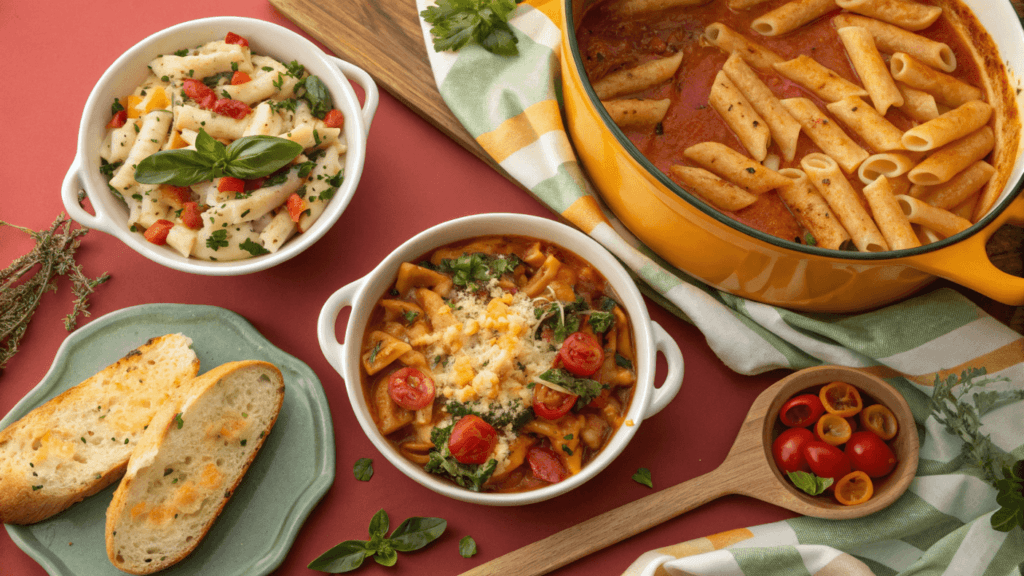
Substituting mostaccioli in cold salads and soups opens the door to countless possibilities. For pasta salads, ziti and penne work wonderfully. Their tube shapes hold onto dressings and mix-ins like cherry tomatoes, olives, and cucumbers. Adding fresh herbs like parsley or basil brightens the dish, making it perfect for picnics or potlucks.
In soups, opt for smaller substitutes like ditalini or short penne. Their size blends seamlessly with broths and vegetables without overpowering the dish. Rigatoni is ideal for thicker soups like minestrone, where it can absorb the flavors while maintaining its texture.
For other creative uses, try tossing cooked substitutes with olive oil, garlic, and sautéed vegetables for a quick weeknight meal. The versatility of these substitutes ensures you can create endless variations with minimal effort.
Key Points for Using Substitutes:
- For pasta salads, choose ziti or penne for the best texture.
- Smaller substitutes like ditalini are ideal for brothy soups.
- Rigatoni works great in thick, hearty soups like minestrone.
- Toss with olive oil, garlic, and vegetables for an easy main course.
Chart: Mostaccioli Substitutes for Different Dishes
| Dish Type | Best Substitute | Why It Works |
|---|---|---|
| Cold Salads | Ziti, Penne | Holds dressing and mix-ins well |
| Brothy Soups | Ditalini, Small Penne | Blends with broth without overpowering |
| Thick Soups | Rigatoni | Absorbs flavor, holds shape |
| Quick Meals | Any substitute | Versatile for sautéed vegetable dishes |
Experimenting with substitutes for mostaccioli allows you to create fresh, exciting recipes that are both simple and delicious. With these ideas, your dishes will always be a hit!
Creamy Baked Ziti with Herb-Infused Tomato Sauce
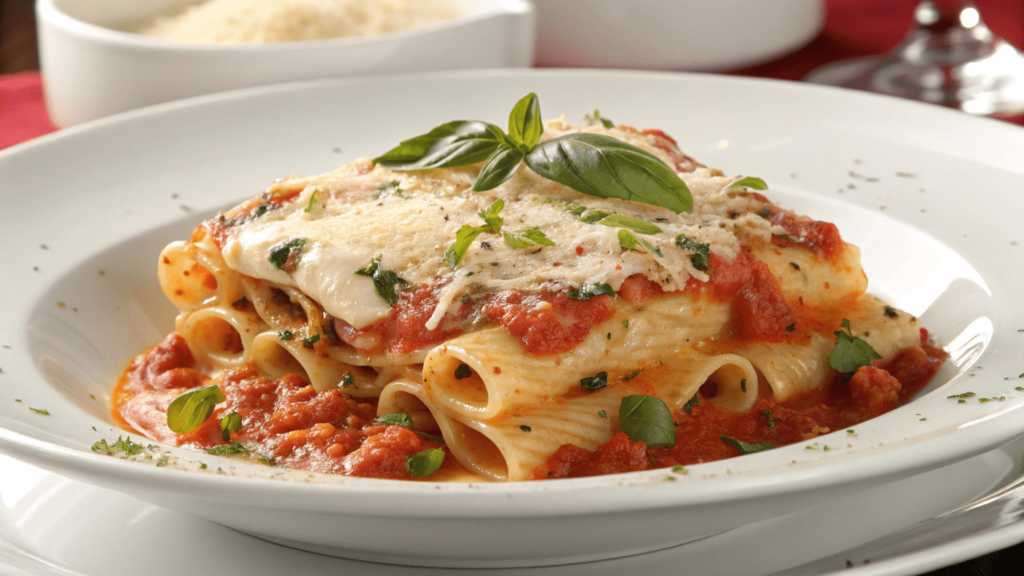
Now that we’ve uncovered the secrets of mostaccioli substitutes, it’s time to roll up our sleeves and dive into a dish that’s bursting with flavor—Creamy Baked Ziti with Herb-Infused Tomato Sauce. Let’s bring this delicious idea to life!
Ingredients
Let’s get started with a collection of flavorful ingredients that work harmoniously to create this dish! Each element plays a special role, and together, they’ll make your Creamy Baked Ziti with Herb-Infused Tomato Sauce unforgettable. Here’s what you’ll need:
| Ingredient | Quantity | Why It’s Important |
|---|---|---|
| Ziti or Penne Pasta | 16 oz (1 lb) | Perfect substitute for mostaccioli; it holds the sauce beautifully and stays firm. |
| Marinara Sauce | 3 cups | Provides a rich, tomatoey base infused with herbs. |
| Heavy Cream | 1 cup | Adds creaminess to the sauce, making it indulgent and smooth. |
| Fresh Basil | 1/4 cup, chopped | Brings a burst of freshness and aroma to the dish. |
| Garlic | 3 cloves, minced | Elevates the flavor with a robust, savory kick. |
| Mozzarella Cheese (Shredded) | 2 cups | Melts into gooey perfection, creating that classic baked pasta appeal. |
| Parmesan Cheese (Grated) | 1/2 cup | Adds a nutty, salty flavor for balance. |
| Olive Oil | 2 tablespoons | For sautéing garlic and herbs, adding richness to the dish. |
| Italian Seasoning | 2 teaspoons | A blend of herbs to deepen the flavor profile. |
| Salt | 1 teaspoon | Enhances the natural flavors of the ingredients. |
| Black Pepper | 1/2 teaspoon | Adds a subtle hint of spice to the sauce. |
| Red Pepper Flakes (Optional) | 1/4 teaspoon | For those who enjoy a little heat in their dish. |
Now that you’ve gathered these amazing ingredients, let’s move on to the step-by-step instructions to bring this recipe to life!
Step-by-Step Instructions
Let’s dive into the fun part—bringing your Creamy Baked Ziti with Herb-Infused Tomato Sauce to life! Follow these simple steps to create a dish that’s packed with flavor and sure to impress.
Step 1: Cook the Pasta
- First, bring a large pot of salted water to a boil. Add the ziti or penne pasta.
- Cook according to the package instructions, aiming for al dente texture.
- Drain the pasta, but don’t rinse it. The starch will help the sauce cling beautifully.
Step 2: Prepare the Herb-Infused Tomato Sauce
- While the pasta cooks, heat olive oil in a large skillet over medium heat.
- Add the minced garlic and sauté until fragrant, about 1 minute.
- Next, pour in the marinara sauce and stir in the Italian seasoning, salt, and black pepper.
- Lower the heat and let it simmer for 5 minutes to blend the flavors.
- Stir in the heavy cream and simmer for an additional 2 minutes. This step adds a velvety richness to the sauce.
Step 3: Combine Pasta and Sauce
- In a large mixing bowl, combine the cooked pasta and the prepared sauce.
- Add half of the shredded mozzarella and grated Parmesan to the mix. Stir well to ensure the cheese is evenly distributed.
Step 4: Assemble the Dish
- Preheat your oven to 375°F (190°C).
- Transfer the pasta and sauce mixture into a greased 9×13-inch baking dish.
- Sprinkle the remaining mozzarella and Parmesan over the top. For extra flavor, add red pepper flakes if desired.
Step 5: Bake to Perfection
- Cover the dish with aluminum foil and bake for 20 minutes.
- Then, remove the foil and bake for an additional 10 minutes or until the cheese is golden and bubbly.
- Once baked, sprinkle the chopped fresh basil on top for a burst of freshness.
Time to serve your masterpiece!
Serving
This recipe makes enough to serve 6 people, so it’s perfect for family dinners or gatherings.
- Serve it hot, straight from the oven, for the best experience. Pair it with a side of garlic bread or a fresh green salad.
- Optional garnishes: A sprinkle of extra Parmesan or a drizzle of olive oil can add the perfect finishing touch.
- For a fun twist, serve leftovers as a creamy pasta casserole for lunch the next day!
Tips and Hacks
Make your Creamy Baked Ziti with Herb-Infused Tomato Sauce even better with these handy tips:
- Tip 1: For a lighter version, use half-and-half instead of heavy cream.
- Tip 2: Add sautéed vegetables like spinach or mushrooms to pack in extra nutrients.
- Tip 3: To save time, prepare the sauce and pasta ahead of time and assemble just before baking.
- Tip 4: Store leftovers in an airtight container in the fridge for up to 3 days. Reheat in the oven or microwave before serving.
Nutrition Facts
- Serving size: 1 cup
- Calories: 400
- Fat: 18g
- Carbs: 45g
- Protein: 15g
- Sodium: 700mg
- Fiber: 3g
Note: Nutrition values are approximate and may vary based on specific ingredients or portion sizes.
Prep Time
Prep time: 15 minutes
Cook time: 30 minutes
Total time: 45 minutes
Note: These times are estimates and depend on your cooking pace.
Frequently Asked Questions (FAQs)
What can I substitute for mostaccioli?
You can easily substitute mostaccioli with other short, tube-shaped pastas like penne, ziti, or rigatoni. Each of these options works well because they have similar shapes and sizes. Penne has ridges for sauces to cling to, while ziti offers a smooth texture. Rigatoni is slightly larger but great for hearty dishes. You’ll love how seamlessly these pastas fit into your recipes!
What pasta is most like mostaccioli?
Penne is the closest match to mostaccioli, thanks to its similar size and tube-like shape. The main difference is that penne often has ridges, which help it hold onto sauces even better. Ziti is another excellent option, as it’s smooth and straight, just like mostaccioli. Both options deliver that same delicious experience you’re looking for in your dishes!
Can I use penne instead of mostaccioli?
Absolutely! Penne is a fantastic substitute for mostaccioli. Its ridged surface makes it perfect for gripping sauces, so your dishes stay flavorful. It also cooks in about the same amount of time, which makes it an easy swap. Whether you’re baking it in a casserole or tossing it with marinara, penne gets the job done beautifully. Give it a try!
Is mostaccioli the same as ziti?
Not exactly, but they’re very similar. Mostaccioli is smooth and slightly smaller, while ziti has straight edges and is often a bit thicker. Both work wonderfully in baked dishes or with creamy sauces. If you’re wondering what pasta is closest to mostaccioli, ziti is definitely one of the top options to consider. It’s like a twin with its own personality!
Conclusion: Embracing Pasta Substitutes for Versatile Cooking
Exploring pasta substitutes is a fun and creative journey. If you’re wondering what pasta is closest to mostaccioli, there are plenty of options to try. Penne and ziti are great alternatives that bring their own unique flair to your dishes. First, consider the sauce you’re using to pick the perfect match. Next, think about the dish type—baked, stovetop, or salad.
Substituting pasta is also an exciting way to experiment with flavors and textures. Whether you love creamy sauces, hearty casseroles, or light salads, there’s a substitute that will work beautifully. Don’t forget to mix things up and try something new! Cooking should always be enjoyable and stress-free.
So, grab your favorite substitute and start creating delicious meals. It’s like giving your recipes a playful twist that keeps them fresh and exciting. Your next pasta dish is just waiting to be amazing!

